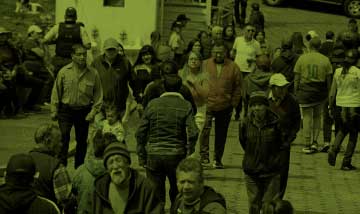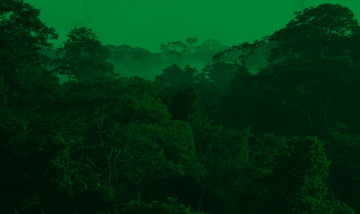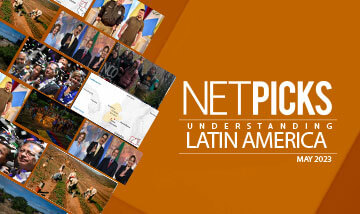Índice
Understanding Latin America
The news is presently dominated by the Covid19-crisis, and with good reason. But sifting through the information and opinion related to the virus and its consequences often proves difficult, and one source we find useful is this collection of selected and categorized articles: https://the-politics-of-covid-19.com/search/. On the other hand, the pandemic has not brought all political life to a standstill. As well as two articles related to the virus (one connected to the vulnerability of Latin American Indigenous populations and the other to the chronic lack of investment in health services in the region),this month we also bring you news from Chile, on the now delayed constitutional process that many hope will correct some of the country’s social and economic inequalities;from the Dominican Republic,where suspension of the February municipal elections provoked a backlash against the governing party; and,finally Guyana,whose future as a major oil producing country has heightened tensions around a disputed general election.
.
.
CORONAVIRUS COULD WIPE US OUT’: INDIGENOUS SOUTH AMERICANS BLOCKADE VILLAGES
Recent studies have shown that diseases such as smallpox and measles may have wiped out up to 90% of the pre-Columbian population of the Americas: perhaps 55 million of an estimated 60 million people. The catastrophe is part of the continent’s historical memory, and it is therefore no surprise that the emergence of the COVID-19 virus has convinced native groups in many countries of the region to take measures in order avoid a repeat of that tragic scenario. The response has been to self-isolate, avoid contact, and consequently escape the deaths that would otherwise occur. A possible danger is that indigenous people who have decided to return to their communities could themselves become a risk factor. According to Sofia Mendonça, a public health physician working in the Xingu region of the Brazilian Amazon, it is important that isolation or quarantine processes to be in place so people can return safely to their villages. Mendonça warns that illegal miners also pose a major risk to indigenous communities and need to be expelled in order to avoid any contact.
Dan Collyns, Sam Cowie, Joe Parkin Daniels and Tom Phillips, March 30th, 2020. https://www.theguardian.com/world/2020/mar/30/south-america-indigenous-groups-coronavirus-brazil-colombia
.
WHY LATIN AMERICA’S HOSPITALS ARE SO VULNERABLE TO CORONAVIRUS
Healthcare may be a social right in Latin America, but the reality is other: access to services is often limited and investment in public health systems historically poor. The arrival of the COVID-19 virus, now firmly entrenched in the region, has highlighted the problems. The number of confirmed cases and deaths continues to mount, while medical systems are in a poor position to confront the resulting need for treatment. There are multiple reasons for the lack of preparedness, but the major factor is the lack of investment; the region spends less per capita than the Middle East or Africa. Complicating the situation is that COVID-19 is not the only problem the region faces; Dengue, for example, continues to a major problem: 1,538 deaths being attributed to the disease in 2019. The lack of investment in health has also been exacerbated by the recent fall in commodity prices and the consequent reduction of financial resources. The article was written on the 11th of March, when confirmed cases of COVID-19 were low, but we have included it in this month’s Netpicks as it provides a worthwhile analysis of the economic basis of the region’s public health problems.
Lígia Bahia and Miguel Lago, March 11th, 2020. https://www.americasquarterly.org/content/pandemic-times-squeezed-budgets-how-coronavirus-will-test-latin-america
.
CHILE:WHAT NEXT?
The demonstrations in Chile may have disappeared from the news due to the COVID-19 crisis, but the tragic toll of dead and injured is still fresh in the minds of the protestors. In all, fifteen people have been killed, 450 people have suffered eye injuries, and thousands are said to have been tortured, raped, or both. March 6th saw yet another fatality due to security forces firing tear gas canisters directly at demonstrators’ heads, and international agencies have consequently called for the reform of Chile’s police force. Nonetheless, the brutality of the repression has not put a stop to the protests. Over 2 million women marched on March 8th. To demanding decent wages, healthcare, access to education, living-wage pensions and equal rights for women and indigenous peoples; the women also called for the resignation of President Sebastián Piñera, whose approval rating at that point was 6%. The Constitutional process, which hopefully will redress many issues of inequality, has been delayed due to COVID-19, but it seems clear that calls for greater economic and social justice to be consecrated in a new Constitution will not be diminished either by the virus or by institutional violence.
Carole Concha Bell, March 11th, 2020. https://lab.org.uk/chile-what-next/
POST-ELECTORAL CRISIS IN THE DOMINICAN REPUBLIC (INTERVIEW)
Interview with Ana L. Lafontaine, professor of Dominican and Latin American history.
The February 16th municipal elections in the Dominican Republic were suspended due to voting inconsistencies, leading to major demonstrations against the ruling PLD party and the Electoral Board. The elections were finally held on March 16th., and the opposition PRM, which did not participate in the demonstrations, has claimed victory. The PLD, in power for the last 20 years, continues the political line of right wing Joaquin Balaguer, who ruled the country for a total of 22 years, including a period of extreme anti-communist repression in which thousands were said to have been killed. The apparatus created by Balaguer still controls much of the Republic’s life, and doubt exists about the real effect any losses at the municipal level might have. Much will depend on the Presidential elections due to be held in May, but these may be suspended due to the COVID-19 pandemic. This interview with Ana L. Lafontaine, published on the 2nd of March, provides the background to the Republic’s present troubles.
Amaury Rodríguez, March 2nd, 2020.https://nacla.org/news/2020/03/02/post-electoral-crisis-dominican-republic-interview
.
GUYANA ELECTIONS 2020: A CRUDE AWAKENING?
Guyana, known as British Guiana until 1996, when it gained its independence from the United Kingdom, is both one of the smallest countries in Latin America (estimated population 750,000) and also one of the poorest countries, with a GDP per capita of about $4,500. Things are changing, however. EXXON’s recent discovery of major oil fields off the country’s coast will make Guyana one of the world’s largest oil producers, and in the process, very rich. Unfortunately, the influx of major amounts of money could have negative consequences. The country’s politics have been dominated by two main parties, both ethnically based, and some fear the new reality could inflame racial tensions and return the country to a previous era of uncertainty. Complicating the issue are the seemingly unfavorable terms of the contract with EXXON, and the dramatic drop in the price of oil. Exxon, however, has stated that the project is economically viable and will go ahead. The general election of March 2nd (after this article was written) has caused further problems, with accusations of lack of transparency; the incumbent ruling coalition of former general David Granger was declared the winner despite the Supreme Court calling for a recount. Distrust is now widespread, and the opposition is refusing to recognize Granger as President.
Holly Eva Ryan, February 27th, 2020. https://blogs.lse.ac.uk/latamcaribbean/2020/02/27/guyana-elections-2020-a-crude-awakening/





